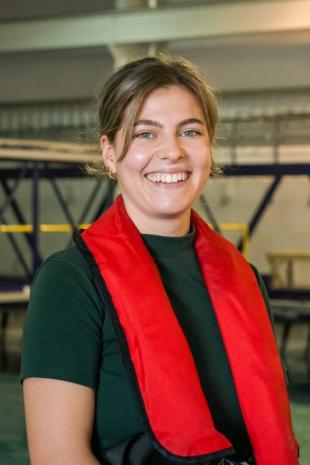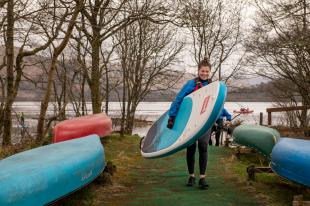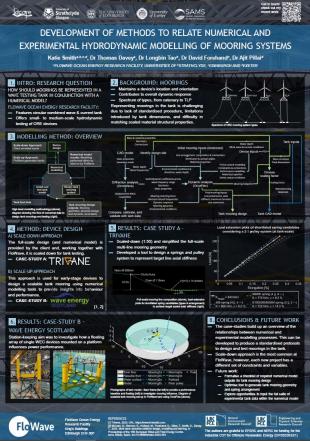Academia or Industry?
Katie has been sponsored by the FloWave Ocean Energy Research Facility (FloWave), a wave and current simulation tank which is a part of the University of Edinburgh. FloWave offers hydrodynamic testing services that support the development of offshore renewable energy technologies. Her project combines aspects of both numerical modelling and tank testing.
The design standards recommend tank testing as a way to validate numerical models and investigate hydrodynamic phenomena that are difficult to simulate. Katie’s work is focussed on mooring system design and testing of floating devices. She is seeking to understand the tank results required to create a strong case for validation of numerical models of these systems, and to streamline the test programmes that deliver the validation data, making them more efficient and accurate. She is currently using the industry standard software OrcaFlex to create a fully coupled hydrodynamic numerical model of a case-study system and will soon be starting some tank testing as part of an iterative cycle of design, modelling and testing.
One of the clients Katie has been working with is Wave Energy Scotland, who are investigating a multi wave energy absorber platform as part of a project looking at the technology and economic case for future hybrid wind and wave energy systems.
In FloWave, Katie is seeing the benefits of being part of a small industry-focussed team. In small organisations, you always have to be ready to deal with the unexpected, especially when working with novel technologies and a range of different clients, and there are always opportunities to fill in when extra hands are needed or for safety.
As well as developing her experimental skills, this experience is giving Katie an appreciation of the communications streams between different entities and the work needed to manage expectations and establish systems when developing new collaborations.
Why IDCORE?
Katie found IDCORE when applying for graduate jobs in the renewables sector. The concept of an EngD was new to her, but she found it appealing. She had enjoyed university and the opportunities this provided for learning and gaining knowledge, but she wanted the next step in her career to be about practical application of that knowledge.
Katie came to IDCORE from an integrated Master’s degree in Mechanical Engineering with Aeronautics at the University of Strathclyde. She had originally wanted to work in aerospace, but following an internship in her 4th year, realised that she wasn’t comfortable with the close links between aerospace and defence and chose instead to focus on renewables in the final year of her undergraduate studies.
The first year of training at IDCORE is intense, but this just meant that Katie’s cohort bonded quickly. Along with cohorts from other years, they are now an important support network for one another. This is even more apparent at FloWave which is now sponsoring three IDCORE researchers, and supporting the work of a number of other current and former IDCORE researchers who are working on behalf of their industry sponsors to test devices in the tank.









